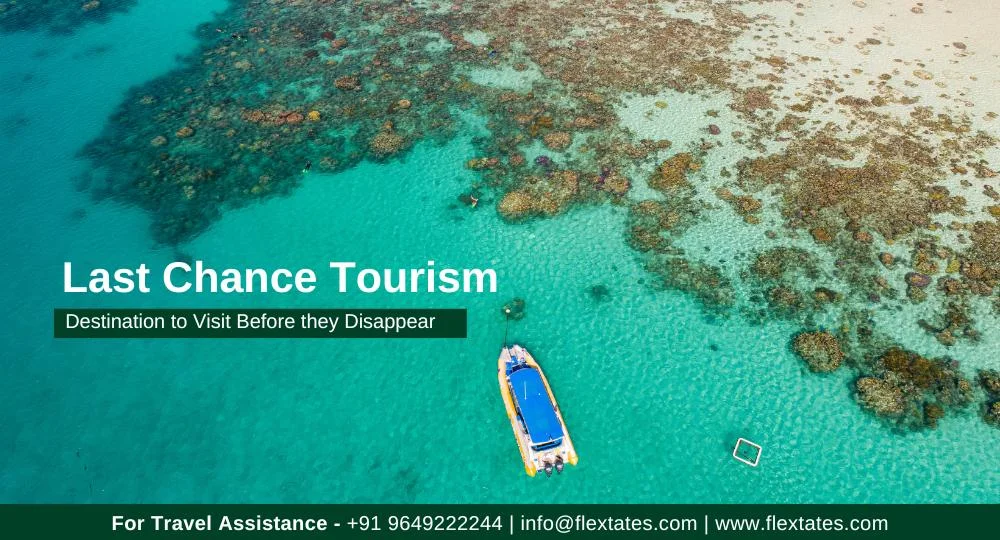“The future is uncertain, but this is your last chance to explore it.” These words capture the essence of Last Chance Tourism, a growing trend that urges people to visit places that could soon be lost due to natural disasters, climate change, or human activities. With the world facing significant environmental and social challenges, Last Chance Tourism offers a unique opportunity to see and experience these threatened locations before they are gone forever.
- Tourism in Antarctica reached a high point during the 2019-2020 season. 36% of the visitors were Americans.
- The tourism industry may have a destructive impact on the environment. For instance, Antarctic trips mean 3.2-4.1 tons of CO2 are generated by a single person.
- People visit the Great Barrier Reef because it will be awesome to see when it is gone. In total, 70% of all tourists would like to experience something which is soon no longer there.
- While tourism provides a flow of money into the local economies, it also destroys natural locations.
What is Last Chance Tourism?
Last-chance tourism is visiting places that will, in the very near future, be destroyed due to natural disasters, changes in climate, and those that might be ruined by man. These destinations are very prone to increase in sea levels, deforestation, and loss of cultures. It’s an opportunity to witness singular cultures and breathtakingly beautiful landscapes while it is still possible.
Types of Last Chance Tourism
- Natural Disaster Tourism
- Climate Change Tourism
- Cultural Erosion Tourism
- Environmental Degradation Tourism
Popular Blog of Tourism – Dark Tourism | India’s Spiritual Tradition Attracting Global Tourists
Natural Disaster Tourism
| Type of Disaster | Destinations |
| Volcano Tourism | Iceland, Hawaii, Italy |
| Earthquake Tourism | Japan, Turkey, California |
| Tsunami Tourism | Thailand, Japan, Indonesia |
| Hurricane Tourism | Florida, Louisiana, Caribbean |
| Flood Tourism | Bangladesh, India, Pakistan |
Climate Change Tourism
| Type of Climate Change | Destinations |
| Glacier Tourism | Iceland, Switzerland, Alaska |
| Polar Tourism | Antarctica, Arctic Circle |
| Coral Reef Tourism | Great Barrier Reef, Maldives, Caribbean |
| Coastal Tourism | Maldives, Seychelles, Florida |
| Forest Tourism | Amazon Rainforest, Borneo, Congo Basin |
Cultural Erosion Tourism
| Type of Cultural Erosion | Destinations |
| Indigenous Tourism | Australia, Amazon Rainforest, Alaska |
| Heritage Tourism | Angkor Wat, Machu Picchu, Taj Mahal |
| Religious Tourism | Jerusalem, Mecca, Vatican City |
| Rural Tourism | Tuscany, Provence, Bali |
| Traditional Arts Tourism | Morocco, India, China |
Also Read – Rann Utsav At Gujrat | Travel Package of Jaipur
Environmental Degradation Tourism
| Type of Environmental Degradation | Destinations |
| Deforestation Tourism | Amazon Rainforest, Borneo, Congo Basin |
| Desertification Tourism | Sahara Desert, Gobi Desert, Australian Outback |
| Pollution Tourism | Chernobyl, Fukushima, Ganges River |
| Industrial Tourism | Abandoned mines, factories, industrial sites |
| Wildlife Tourism | African Savannah, Galapagos Islands, Borneo |
Popular Destinations of Last Chance Tourism
| Destination | Details | Threats |
| Great Barrier Reef, Australia | This coral reef is the largest in the world, hosting a vast diversity of marine life. | Warmer ocean temperatures and pollution are causing coral reefs to bleach. |
| Maldives | An island nation is known for its beautiful beaches and rich marine biodiversity. | Rising sea levels threaten to flood and submerge small islands. |
| Everglades, Florida, USA | A unique habitat where many species, like alligators and manatees, thrive. | Climate change and loss of natural areas are affecting water levels. |
| Mount Kilimanjaro, Tanzania | Africa’s tallest mountain is home to glaciers and diverse ecosystems. | Glaciers are melting, and changing climates are leading to reduced snowfall. |
Last Chance Tourism can have positive effects:
- Preservation
- Economic benefits
- Understanding different cultures
- Special Adventures
- Personal growth
Last Chance Tourism can have negative effects:
- Harming the environment
- Cultural exploitation
- Making things too commercial
- Ethical dilemmas
- Exacerbates threats raising tough questions
- Making problems worse
Motivation for Last Chance Travel
- To see unusual sights and cultures before they are gone.
- Feeling that one needs to visit places before they change radically.
- Wanting to help in conservation and promoting eco-friendly travels.
- I’m after both significant and life-changing travel experiences.
- A challenge to travel to the most remote or less traveled destinations.
- Learning about and exploring various cultures and customs.
- Travel to support research and conservation.
- It creates lifelong memories and at the same time contributes to the preservation of endangered places.
- Tourism responsibly will undoubtedly contribute to the locals and the economy.
- Finding private meaning and connecting with nature and cultural history.
Popular Read – Pushkar Camel Fair 2024 | Best Shopping Places of Jaipur
Ethical Considerations in Last Chance Tourism
Last Chance Tourism provides unique experiences and opportunities for conservation but simultaneously raises several significant ethical concerns. Here are some main points to think about:
- But promoting travel to sensitive places could be inadvertently contributing to the problems they already face. For instance, more tourists translate into more pollution, consumption of resources, and a lack of respect for local cultures.
- There is also the risk of exploitation by businesses that may chase away the locals or cause them to change their customs for money.
- They may mimic local traditions, which reduces them to consumer goods or forms of entertainment.
- The usual meaning of Last Chance Tourism involves trips to remotely located and fragile environments that have several environmental issues, such as habitat destruction and pollution.
- In fact, striking a balance in the scale for cultural heritage and natural beauty, while keeping the financial benefits out of tourism, may be pretty tricky for the tourists and tourism businesses accordingly.
Last Chance Tourism provides a unique opportunity to see sights that, in time, will cease to exist. While this type of tourism may have numerous benefits for the local economy and raise awareness, it is an issue that must be taken with responsible consideration, weighing pros against cons and considering sustainability first and foremost. That way, we can begin to contribute to their preservation effort and be assured that future generations will still see and marvel at these valuable locations.


